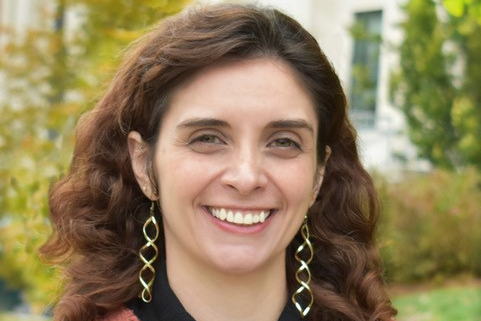In January 2020, the Department of Plant Science and Landscape Architecture welcomed Mariana Fragomeni as an assistant professor. She had been an adjunct professor during the 2019 academic year.
Originally from Brazil, Fragomeni lived in Michigan for periods of her childhood, as required by her father’s employment with Ford Motor Company. She moved to the United States to attend graduate school at the University of Georgia (UGA) with her husband, Breno Fragomeni, an assistant professor in the Department of Animal Science .
During her Ph.D. studies at UGA, Fragomeni was an intern with the CAHNR landscape architecture program Community Research & Design Collaborative on a collaborative (CIRCA), studying sea level rise and resiliency in coastal Connecticut.
Fragomeni’s research focus is climate adaptive design. “I am always working on the intersection between climate science and practical applications that take the best approach so that people feel well in their environment,” she says.
“I started off in architecture, and that is when I first became interested in sustainable design. My research has moved from site design to urban design. The question is how to connect these pockets of green space with others in the region. It’s not always about maintaining huge parks but small areas as well. We have to consider whether every green space plays a role in the bigger picture.”
Many of these green pockets serve vulnerable populations such as the elderly or children, and provide a healthy place where residents are able to cool down during the summer. This requires design that provides air movement and shade.
“On a larger scale, these projects need to focus on preparing people for climate change and consider how to provide green infrastructure to avoid urban heat islands,” Fragomeni says. “We already have vulnerable people in our cities, already have a need for these places in our cities to improve the quality of life. These are essential techniques we need to think about in our urban studies. It’s about adapting to climate change and thinking ahead to designs that focus on the health and wellbeing of citizens.”
As a faculty member, Fragomeni enjoys creating classes that are active and hands-on.
“I think my students need to deal with real world situations,” she says. “I need to create critical thinkers who are information seekers that do informed design.”
Fragomeni earned her BS in architecture and urbanism at the Universidade Federal da Bahia in Brazil, her masters degree in environmental planning and design, and her Ph.D. in geography and integrative conservation from the University of Georgia. She was excited to join the CAHNR as a full-time professor.
“I love working at the College,” she says. “Everyone is so friendly and helpful and so many people were willing to show me the ropes. I felt welcomed and part of this department even when I was an intern and adjunct. I still feel very welcome.”
“I have an interdisciplinary background, so it feels very serendipitous to be at UConn and CAHNR, where interdisciplinary work is encouraged. There’s a lot of opportunity for that synergy here. Anyone who works with climate change cannot work in isolation. It’s not going to be one single researcher but will take a trans-disciplinary approach that includes outreach. I can’t do this type of research without engaging with communities working side-by-side with local governments and institutions.”
The Fragomenis are enjoying the peace and quiet surrounding Storrs, which includes daily walks in nature with their three-year-old daughter. Says Fragomeni, “I didn’t have a clear vision of what life in rural Connecticut would be, but it’s been a really interesting experience. Our lives are very family oriented and our quality of life has improved. I love it.”



